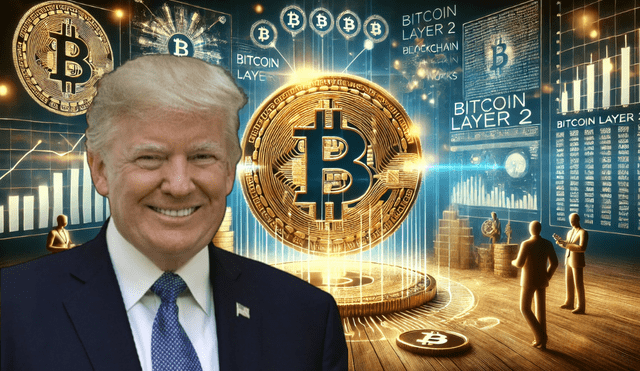Bitcoin Layer 2: The New Private Banking System Trump Is Quietly Pushing Forward
Trump has changed his stance on Bitcoin and is promoting a regulatory environment that could allow Layer 2 companies to operate as banks, eliminating intermediaries.

While Europe plunges into the imposition of Central Bank Digital Currencies (CBDCs), the United States may be moving in the opposite direction. Under a potential Donald Trump administration, Bitcoin Layer 2 could solidify as the foundation of a new permissionless private banking system, openly challenging traditional financial control.
The interesting part is that Trump is not only doing the right thing, but he is doing it far better than expected. Until recently, his stance on Bitcoin was ambiguous or negative. However, he now not only acknowledges its importance but also seems to be promoting a regulatory environment where companies operating with Bitcoin can achieve a banking-like status. This shift is not just rhetorical—it is potentially revolutionary.
Bitcoin Layer 2 as New Financial Infrastructure
The core function of traditional banking is the consolidation and settlement of transfers between two parties. With the advent of the Lightning Network and other Bitcoin scalability solutions, that function no longer depends on banks but on a global decentralized network that settles payments instantly without intermediaries.
If companies built on Bitcoin Layer 2 gain regulatory recognition under Trump, we could witness the birth of a parallel private banking system based on sovereign, incorruptible money. This would eliminate intermediaries and pave the way for new financial services without the need for traditional banking licenses.
The Companies Already in the Race
This possibility is not just theoretical. Companies like Strike, River Financial, and Unchained Capital are already building business models that challenge traditional banking. Even Kraken, which obtained a banking charter in Wyoming in 2020, could benefit greatly if a Trump administration further opens the doors to this model.
There are also precedents like Custodia Bank, which attempted to operate with Bitcoin under a traditional banking structure but was blocked by the Federal Reserve. If Trump changes the regulations to allow Layer 2 companies to access licenses or recognize their status as private banks, the story will be very different.
Europe and CBDCs: The Path of State Control
Meanwhile, Europe is moving in the opposite direction with CBDCs, which in practice mean greater surveillance and control over citizens’ money. A programmable digital euro could restrict what people can spend their money on, impose automated negative interest rates, and completely eliminate financial privacy.
The United States could become the counterweight to this model if, under Trump, Bitcoin is allowed to integrate into the financial system without the regulatory hurdles that have kept it on the sidelines. This would not only impact the U.S. but could also set a global precedent.
The Risk for Traditional Banking
If Bitcoin Layer 2 consolidates as the new private banking system, major banks would face an unprecedented disruption. The Federal Reserve and the current banking system rely on their monopoly over payments and liquidity. If Bitcoin companies can offer these services without intermediaries, why continue using traditional banks?
This could explain why the Biden administration has been aggressive in its regulation against Bitcoin, while the traditional financial sector has lobbied to block any innovation that threatens its power. The key question is: Will Trump actually take this revolution to its ultimate consequences?
Can the U.S. Lead a New Financial Standard?
If Bitcoin Layer 2 is recognized as banking infrastructure under a Trump administration, the global impact will be massive. Emerging countries, already seeking alternatives outside the dollar, could turn to Bitcoin as a viable option.
A scenario in which the United States adopts a Bitcoin-based financial model while Europe and China tighten their state control with CBDCs would mark the beginning of a new global monetary war:
- CBDCs and state control in Europe and China
- Bitcoin-based banking and financial freedom in the U.S.
The competition between these models will determine the future of money.
Trump Is Doing Much More Than Expected
For many, Trump was a Bitcoin skeptic. However, his stance has evolved to the point where he could become the first president to integrate Bitcoin into U.S. economic policy.
If he manages to turn Layer 2 into an alternative private banking infrastructure, we would be witnessing a paradigm shift far greater than anyone imagined.
Europe chooses control. China tightens its surveillance. Trump, surprisingly, might be opening the door to the greatest financial revolution of our era.